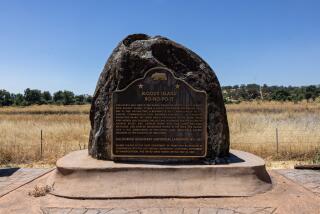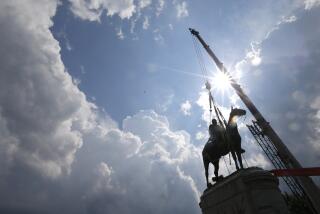Editorial: Fort Bragg’s name is nothing to brag about
Braxton Bragg was a general in the Confederate army, and a bad one at that. It’s perplexing that the federal government decided to name a military installation in North Carolina after him decades after he turned traitor and fought on the wrong side of the Civil War.
But stranger still is that his name lives on in a California city in which, the story goes, he never set foot.
Fort Bragg was incorporated as a city in 1889, 32 years after Lt. Horatio G. Gibson established a military post there to control the Native American population in Mendocino County and named it after Bragg, his former commander at the Presidio at San Francisco. Don’t judge Gibson too harshly; it was years later that Bragg, a veteran of the Mexican-American war, would go on to ignominy as one of the Confederacy’s worst generals.
The story of the town’s namesake faded as the military garrison grew into a lumber town and, much later, a destination for tourists. That is, until 2015, when a racist named Dylann Roof shot nine people to death during a service in a Charleston, S.C., church. In the aftermath, the state Legislative Black Caucus asked the city’s leaders to consider changing the city’s name. They didn’t.
The issue has popped up again as part of the long-overdue movement to jettison the shockingly abundant racist artifacts strewn about the nation. Statues of Confederate soldiers have toppled along with those of other controversial figures. Food companies are finally retiring brands that advance racist tropes such as Aunt Jemima and Uncle Ben’s. Institutions, bridges and schools bearing the names of racists or Confederate icons are being reconsidered.
After getting a number of requests from residents and outsiders, the Fort Bragg City Council agreed to consider several options at its Monday meeting, from picking another famous Bragg to honor (there are a few) to placing a name-change measure on the November ballot. We hope the council puts it to a vote and lets the people in the community decide.
We can think of no good reason to cling to the name of a man who was peripheral to the city’s history but central in the nation’s shameful history of slavery. And a little rebranding is unlikely to scare off the town’s biggest source of income: tourists. After all, they aren’t coming to tour a mighty military fort, because there isn’t one, or visit the Bragg memorial, because it isn’t here.
Indeed, the draws for this city on the bluffs are the view of the rugged and majestic coastline, Glass Beach and the Skunk Train, a fleet of old historic rail cars that used to carry lumber but now cart tourists through groves of old-growth redwood trees and over picturesque bridges.
Still, the issue has divided observers.
Some supporters would like to see the name changed to “Noyo” for the river that flows through Fort Bragg, as well as the bridge that fords it and the harbor into which it flows.
Others suggest it would be more fitting to choose a name that honors the Native Americans who lived there long before Gibson showed up.
Meanwhile, residents whose families have lived in the area for decades if not generations lament the removal of a name too deeply ingrained in their lives, and many opponents cite practical concerns as well: Changing the city’s name would take money away from other civic needs.
City officials estimate that swapping out signs, updating the website and making other changes that a new name would require could have a price tag of more than a quarter-million dollars. The largest source of Fort Bragg’s general fund comes from tourism, an industry hit hard by coronavirus closures. To prepare for expected revenue losses, the city has already reduced its workforce by 17%.
Adding another economic burden on Fort Bragg is legitimate reason for people to be wary of a name change. For that reason, we would hope that the supporters pledge more than just a letter or vote. Putting together a fund to cover name change expenses, if supporters can afford it, might make the proposal a lot more palatable to the some 7,300 Fort Bragg residents who rely on city services.
Regrettably, the people of North Carolina won’t even have the chance to weigh in on whether to dump the name of their Fort Bragg. President Trump said he won’t consider changing the names of military bases that honor Confederate leaders. (It’s hard to believe that in 2020 there are more than one.)
Now is an opportune time for Fort Bragg, Calif., to reconsider what it calls itself. The City Council should give residents the chance to decide, at long last, if they want to continue to live under a name that symbolizes the nation’s racist past or pick one that better reflects the spirit and values of their coastal hometown.
More to Read
A cure for the common opinion
Get thought-provoking perspectives with our weekly newsletter.
You may occasionally receive promotional content from the Los Angeles Times.










